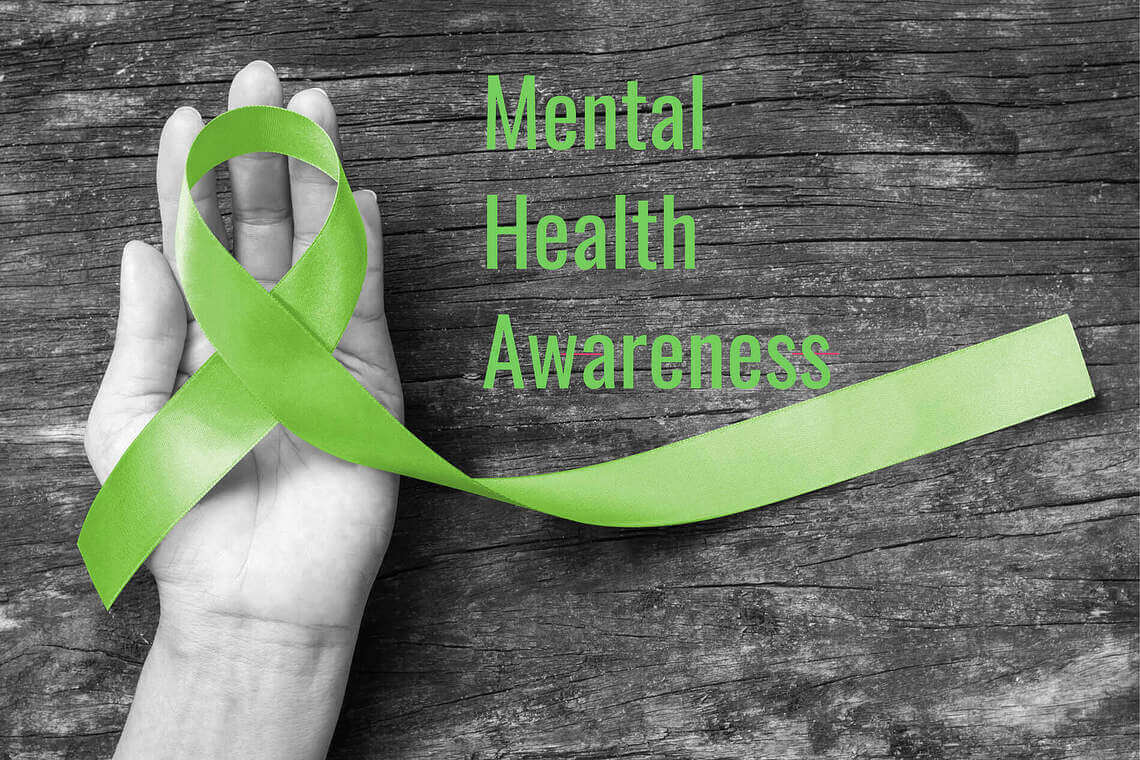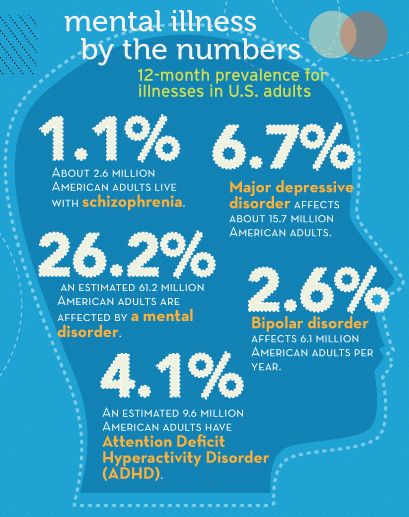
Alarm goes off. Rush to work. Study for test. Work out. Sleep. Be social.
Every day, we do most, if not all, the actions above in order to maintain a lifestyle. But soon enough, we go on overdrive and we ultimately become overwhelmed. A busy, stressful like can take a toll on our mind, body, and spirit. In turn, our mental health becomes impacted.
It’s time we focus on ourselves, and remember that we need to take a break once in a while. If not, unfortunate consequences, like mental health issues, may occur.
![]() Illnesses
Illnesses![]() Signs
Signs![]() Treatment
Treatment![]() Celebrities
Celebrities![]() Awareness
Awareness
What Is Mental Health?
Mental health is essentially the health of the mind, and any potential threats that could come to it. It affects millions of people around the world. and it is described as “a disease of the brain that causes disturbances in one's thoughts or their behavior.”
There is still a deep stigma associated with the topic, leading to a lack of discussion and a need for awareness among the general population to remove the stigma.
Mental Illnesses
To start, mental illness affects more than 56% of the American population. In fact, one in four adults, and one in five children are affected by mental health issues.
There are over 200 million classified forms of mental illness, which are separated into five different categories:

- Mood disorders
- Schizophrenia/psychotic disorders
- Anxiety disorders
- Panic disorder
- Eating disorders
Other mental health conditions, like addiction disorders, personality disorders, obsessive-compulsive disorders (OCD), and post-traumatic stress disorder (PTSD), are also classified as mental illnesses.
The common conditions today are anxiety disorder and depression.
The signs range from internal to external. Those struggling with mental illness may change their sleep or appetite or moods, have trouble thinking, an increase in sensitivity, exhibit unusual behavior, and have nervousness.
A study done by APA has shown that almost half of all mental illnesses begin by age 14, while 75% of the population begin by 24. Rates of youth with severe depression have increased from 5.9% in 2012 to 8.2% in 2015. (1) But, I’ve known kids as young as 13 and adults as old as 60 to have depression.
Signs of Mental Health Illnesses
There are many different signs of mental health illnesses, and the main ones are listed for you below:
- Sleep or Appetite Change(2)
- Mood Changes(2)
- Problems Thinking(2)
- Increased Sensitivity(2)
- Unusual Behavior(2)
- Nervousness(2)
Many people diagnosed with mental illness will find success and recovery through individual and group treatments.(3)
Treatment of Mental Health Illnesses
Fortunately, mental health is easily manageable. Popular treatments include:
1.) Psychotherapy
2.) Medication
3.) Case management
4.) Support groups
5.) Alternative medicines
6.) Hospitalization
Therapy and medication are effective ways to manage your health on a day-to-day basis. Just make sure that the medication is right for you, since different minds react to different medications.
Your therapist is also important to consider thoroughly. Talking to someone is a brave yet terrifying experience, so you want to make sure you have therapist you can trust.
Famous Celebrities With Mental Health Issues
- Catherine Zeta Jones- Bipolar II Disorder
- Mel Gibson - Bipolar Disorder
- Michael Phelps- Attention Deficit Hyperactivity Disorder(ADHD)
- Kurt Cobain- Bipolar Disorder
- Brooke Shields - Depression
- Howard Hughes- Obsessive Compulsive Disorder (OCD)
Mental Health Awareness Activities
Fortunately, the conversation of mental health has begun and it’s not stopping anytime soon. More and more people everyday focus on the necessity of mental health, people like politicians, school administrators, and even celebrities. Young stars like Selena Gomez, Demi Lovato, and Ariana Grande have all used their platforms to talk about mental health issues, and thereby reducing the stigma associated with them.
Increased awareness and understanding will help those suffering to successfully manage their symptoms and minimize other risks. The way we can do this is through five easy actions:
1. Learn about Existing Resources
Nearly 80% of 6-17-year-olds who are defined as needing mental health services do not receive mental health treatment.(4)
Mend the gap of a lack of treatment by educating yourself of all the resources available to you. NAMI, National Alliance on Mental Illness, offers a pledge to vow to promote an understanding for those dealing with mental health.
2. Participate or Host a Walk for Mental Health Awareness
Participate in an Organization - Research to find local walks for mental health in your community and sign up to participate. Or, you could create your own!
3. Talk About the Awareness
Start talking with others on mental health. Dialogue is just as important as the others on the list. Talk to your friends, peers, coworkers. A stranger. Let’s keep the momentum for awareness alive within our speech. In addition, celebrating the designated days assigned for mental health allows plentiful traffic for further awareness. May is Mental Health Awareness month and October 1 - 7 is Global Mental Health Awareness week. This will also allow you to participate and interact easily with others who advocate just like you.
4. Create a Mental Health Awareness Bracelet
Like always, creating your own customized wristband on mental health is a great way to promote awareness through instant marketing. Make sure to make your bracelet green to match Mental Health’s green ribbon. Check out Rapid Wristbands to create your wristband with a message and share it with us on social media!
Final Thoughts
Mental health is just as important as physical health. Just because we don’t see it, doesn’t mean it isn’t there. As long as we keep focusing on its importance, and helping others in need, society will improve for the better. As long as we lend an ear, awareness will spread, and in turn, a positive change.
Resources:
.png)
.png)
.png)


.png)
.png)

.png)
.png)
.png)
.png)
.png)
.png)
.png)
.png)
.png)
.png)
.png)
